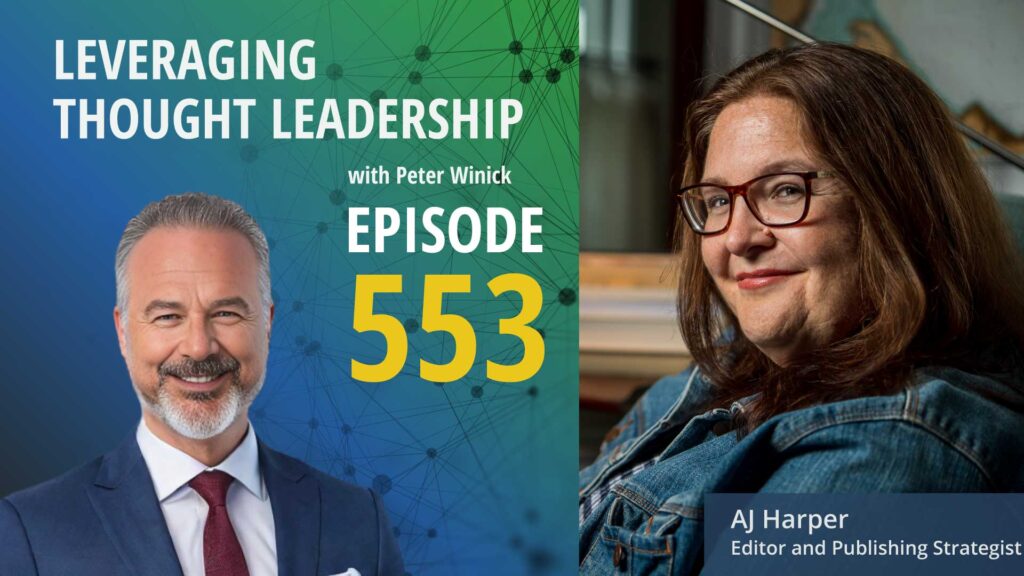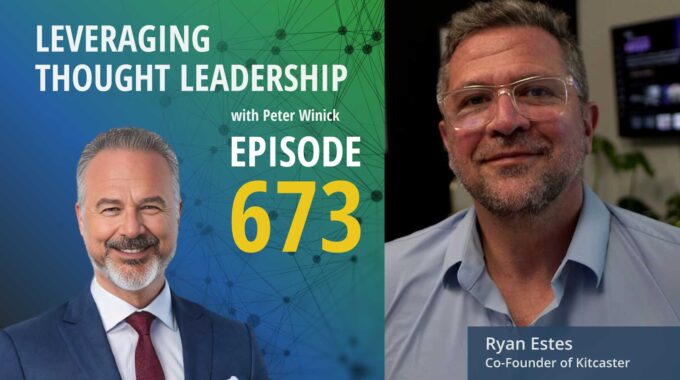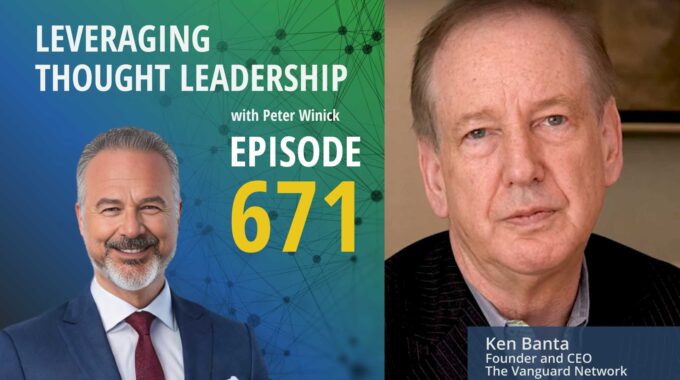Why Great Thought Leaders Don’t Play the Publisher’s Game Peter talks with publishing expert Ken…
Unveiling the Art of Ghostwriting | AJ Harper

Navigating the Frameworks, Models, and Trends for Scalable Impact
A conversation with Peter Winick and Bill Sherman about the state of Thought Leadership from an enterprise perspective.
In this podcast episode, we venture into the intricate world of ghostwriting with AJ Harper, a seasoned editor and publishing strategist who helps authors write transformational books that enable them to build relationships, grow their brands, and make a significant impact on the world.
Ghostwriting, a term often shrouded in misconceptions, is dissected to reveal its multifaceted nature, shedding light on the diverse roles a ghostwriter can assume. AJ underscores the importance of understanding that ghostwriting is an umbrella term with no standardized regulations, urging aspiring authors to exercise caution and discernment in their collaborations. Central to the conversation is the collaborative essence of ghostwriting. AJ shares how a skilled ghostwriter can serve as a guiding force, refining the author’s concepts and intellectual property while remaining attuned to their vision for the book. Contrary to the misconception that ghostwriters simply pen entire books in isolation, AJ emphasizes that most engagements involve a symbiotic relationship aimed at honing the author’s message, understanding their audience, and ensuring the book fulfills its promise.
As the conversation unfolds, AJ offers invaluable insights into optimizing outcomes with a ghostwriter. From clarifying book fundamentals to incorporating contractual safeguards such as exit clauses and rewrite provisions, authors are equipped with practical strategies to navigate the ghostwriting process effectively. Furthermore, AJ underscores the paramount importance of long-term book marketing—a facet often overlooked by aspiring authors. By emphasizing the need for sustained promotional efforts spanning several years, AJ empowers authors to harness the full potential of their literary endeavors.
In essence, this podcast episode serves as a beacon of guidance for aspiring authors navigating the labyrinth of ghostwriting. Through AJ Harper’s illuminating insights and practical wisdom, listeners are empowered to embark on their literary journeys with clarity, purpose, and confidence.
Three Key Takeaways:
- Ghostwriting involves collaboration to refine concepts, understand readers, and meet the author’s goals, emphasizing clarity in book fundamentals.
- Authors must be prepared for long-term marketing efforts, nurturing their books for several years beyond publication to maximize benefits.
- It’s crucial to ask the right questions and seek referrals when choosing a ghostwriter, ensuring they have relevant experience in the author’s genre.
If you need a strategy to bring your thought leadership to market, Thought Leadership Leverage can assist you! Contact us for more information. In addition, we can help you implement marketing, research, and sales. Let us help you so you can devote yourself to what you do best.

Transcript
Peter Winick And welcome, welcome, welcome. This is Peter Winick. I’m the founder and CEO at Thought Leadership Leverage. And you’re joining us on the podcast today, which is leveraging thought leadership. Today, my guest is A.J. Harper. She’s an editor of a publishing strategist who helps authors write transformational books that enable them to build relationships, grow their brand, and make a significant impact on the world. As ghostwriter and a developmental editor, she’s worked with hundreds of authors, from newbies to New York Times bestselling authors with millions of books sold. She teaches her method from the Top Three Book workshop and the Must-Read Editing Workshop. She’s a partner and head writing coach for Heroic Public Speaking, which is the speaker and training program that, Mike report run. And she’s been the writing partner of Michael Wits for many years. So without further ado, welcome aboard. AJ.
A.J. Harper Hey, thanks for having me.
Peter Winick So let me let me start with sort of what might be an easy question, but I think it’s an important one is when a new author, or maybe an inexperienced author is entering this sort of crazy, confusing world of publishing and such, they get a little bit confused around ghostwriting. Right? And I think, you know, even in your bio, you’re distinguishing sort of that developmental piece from ghostwriting and all that. I would review. Ghostwriting is on a continuum from the bad end of the spectrum, as you write, and I’ll put my name on it. But why don’t you explain the different, you know, 50 Shades of ghostwriting, if you will?
A.J. Harper Well, it’s an umbrella term, so. And it’s not a regulated term or industry. So we have to be aware that when you’re looking for a ghostwriter, but a good ghost can help you refine your concepts and your intellectual property and realize your vision for the book. And ghost. And when I started out, sometimes I had clients who just gave me the concept. I even wrote a whole book once for just from a table of contents. I have almost no interaction with that person at all. And, that’s a rare situation, but it does happen. Primarily what I did as a ghost and what so many ghosts do is to help you refine your message, understand your reader, organize your content, make sure that the book is delivering on the promise. There’s a fair amount of therapy happening there, and it’s usually a collaboration to get that clarity around how is this book going to be organized? How is it going to speak to the reader? How is it going to meet the author’s goals in terms of their business and thought leadership? And then the writer will then go and make that happen. But sometimes it’s also sometimes you have authors who have written some of it, or they have a bunch of notes or transcripts or training. So sometimes you have something to work with. It just depends on each person and how they like to work.
Peter Winick So I think that’s a great explanation. And I also think it’s important for people to understand there is no stigma attached to using a ghost, right? In fact, most people that are thought leaders, I don’t want to say they’re not writers, but they’re, you know, what they’re trying to bring to the world is their expertise, their frameworks, their models, their methodologies, their perspectives, etc. and they haven’t written as many as you’ve written, obviously. Right. So they’re always going to be or not always. They’re more of a novice and just tapping into someone that’s been through that before, right? Again and again and again brings a lot to the table. And the process for an author, I think, well, I don’t know how you respond to that.
A.J. Harper Yeah, absolutely. There’s no shame in that game. None at all. I will say I never was a ghost for fiction, so I do. I did draw that line in this. And so I feel like that’s a different thing. That’s, you know, coming from a different place. But I never felt ownership of my client’s work because their stories, their ideas, their concepts, their proof of concept, that was all them. I just know how to put it together in a way that really speaks to readers. I do think it’s important to note that just because somebody says they’re a ghost writer, they can always be you. So I think one of the reasons I was successful right away is because I was able to do the voice of the author and in fact, help them sometimes enhance and find it. But that just comes from my unusual background, because I was a playwright before that. Yeah.
Peter Winick So the playwright you mentioned, therapist, you mentioned lots of other things that are part of what you do. One of the things that I find interesting with regards to the sort of ghostwriter client relationship is in most professions, if someone is super qualified on paper, that’s pretty good, right? Like if I’ve got a plumber and they’ve got a license and I’ve got a plumbing need, that’s awesome. You know, if I’ve got a dentist and a tooth problem. Awesome, right? But many times it just it doesn’t click right because it’s such a intimate relationship. It’s such a personal relationship. So when someone says, help me find my voice, that assumes that they know what their voice is and they can show you. I’m snarky, I’m funny. I’m thought like, what does that mean? It’s almost like if I say to someone, if I hire someone to pay my house and say, painted blue, they could go sky blue, right? Or they could go navy blue. And if I wasn’t specific, oops. Like, weren’t the odds of us getting the blue that we both thought we were getting is pretty low. So how do you how do you deal with sort of that intimate level of the relationship and making sure you’re in sync with the client? Because that’s you? I don’t I don’t really understand how that’s done so, so well by so many great ghostwriters.
A.J. Harper Well, my system was pretty simple. I, you know, I had to here. So I do a lot of listening in conversation. So we have a lot of phone calls. I was back in the day. Now I would probably be on zoom, but a lot of phone calls and I listen really, really carefully and also record the calls so I can see what are the patterns of speech, what are the rhythms, how do they talk? What do they say a lot? What words don’t they use so that I could get their natural voice? And then I also always asked for please send me a piece of writing that you love that feels really sounds like you. So I would ask them to give me something, because often I was dealing with an academic or a person, a corporate person who had had been trained out of having a voice. Because they couldn’t really have it. So I had to help them find it by just listening to them. So you can’t really expect a ghost to get it if you aren’t talking to them on a regular basis.
Peter Winick And lastly, if I were to ask you for 3 or 4 tips to give to the author on how to optimize the probability of a successful outcome, successful relationship with the ghost, what would you say to them? Sort of the…
A.J. Harper Okay. I totally have it . Yep, I got it. Number one, have your book fundamentals really clear. So in my book, Write a Must Read. Those fundamentals are really clear idea of who your reader is and what’s what they want and what they perceive as standing in the way. Really clear, transformational message and really clear promise of the book. Have that ready to go. You have. Don’t expect them to give it to you. Do that. Work yourself. Number two get in your contract and out clause after, say two, possibly three chapters. By then you should know if that person can nail your voice or not. So have it so that you can, after 2 or 3 chapters, get out of the contract. Of course, pay them for the work they did, but then move on to a different person. Don’t wait, I understand that.
Peter Winick So? So there’s a point that you’re saying it’s not one chapter five 2 to 3 where you all have had a chance to dance together. See if it’s working and then you can go, you know, you’re lovely, you’re talented, I adore you, but I’ll still be friends. And obviously, you got to get paid for your work. I like that idea, but I think people get stubborn, like, oh, just one more, you know, one more, one more, one more. But I like that 2 to 3 and, you know, giving it a timeline or a number of chapters or something like that, and then reevaluate, knowing what you know. Now, would you still hire this person to do the job that you’ve attached them to do? And if not, let it go, and they’re going to be frustrated because they wasted some money and time and all that. But I think that’s really wise.
A.J. Harper I mean, that was I always had my contracts that anybody could pull out at any time. The reason being that you have to get to a point where you feel like, okay, I can do this person’s voice. And sometimes people are just, you know, from my perspective as a ghost, I want to give that right up front to say, let’s that’s our goal. And if we can’t get there, we shouldn’t move forward. So you want to have that expectation. Sometimes the chemistry just isn’t there. The third thing is I would build into the contract that your ghost will do rewrites until it’s right, as long as the scope of the project doesn’t change. But you don’t think.
Peter Winick You’re in sometimes in conflict, because then it’s a define a rewrite and be defined scope. Go deeper on both of those because I think that’s really.
A.J. Harper So remember I said fundamentals. So if your fundamentals change where you were going to write a book on leadership and now you’re going to write a book on finance, those are different books. So they’re not going to write you two separate books for the same fee. But the point being, you need a person who will see you through the editorial process with your publisher. You don’t want the ghost to disappear right when you turn it in, because you might need the ghost to actually help you with the revisions. I did a lot of that off, and I did it as a super stealth, so that even their editor at their house didn’t know I was doing it. Yeah, yeah. But, you need that ghost to stay with you.
Peter Winick Love it. Those are great, great tips.
Peter Winick If you’re enjoying this episode of Leveraging Thought Leadership, please make sure to subscribe. If you’d like to help spread the word about our podcast, please leave a five-star review at ratethispodcast.com/ltl and share it with your friends. We’re available on Apple Podcast and on all major listening apps as well as at thoughtleadershipleverage.com/podcast.
Peter Winick So this is not your domain expertise where I’m going now. But I want to get your insights because you’re sort of there, you know, in the periphery. What is it that you see that are changes in the marketplace that authors should be aware of relative to getting the book out there? Because writing a book is hard, period. Full stop, whether it’s with the ghostwriter, not whatever. It’s really important. There’s intrinsic reasons. I mean, there’s so much emotional investment, work opportunity. It’s expensive. Right? Like however you choose to measure that. And then the flip side of that is marketing and having a commercially successful book. Wow. That makes writing a book look easy, right? So what is it that you see on the commercial and marketing side that people should be thinking about?
A.J. Harper You know, honestly, it’s not even so much trends. It’s just getting them to do it. I mean, I don’t think I think people need to shift their mindset around the. Marketing of the book. They tend to all the build up to the launch. And then the launch is this giant fireworks display. And then after that, it sort of fizzles. And I think authors aren’t prepared for the long game. You need to be prepared to support your book in terms of marketing five, at least five years. And if you are thinking about.
Peter Winick So I want to just stay there for a bit because the entire my opinion publishing industrial complex, if you will exist for this sort of pre-launch launch phase, call it two months before the book’s out, three, 4 or 5 months after, and then everybody goes away. However, a book and this is really critical and I, you know, you picked five, you’re going to say has a shelf life, no pun intended, of 5 to 7 years. So why would you give up on it after 4 or 5 months? The data shows that most books again, all I know is nonfiction, right? Sell better year two than year one, right? But there’s no Wall Street Journal list of books that did good 19 months after publication. So it’s less sexy, but it’s more important in terms of building your platform, building your business and all that. So I love that you’re where I am in terms of it’s designed for the short game, but you’ve got to play the long game.
A.J. Harper Yeah. Thank you. So publishing is focused on front list, the books that are about to come out and the books that have been out for six months to a year, but that, that so that I think authors tend to focus on that, then they think that that’s their journey. But you need to nurture it. You mentioned 5 to 7 years behind me is Profit First, which I wrote with Mike Micklethwait. We’re in year ten on that. We’ve sold over a million copies. I still get a really nice royalty check twice a year from that book, and I will continue to get it.
Peter Winick So when just putting in content, I just I just want to you’re a little bit humble there, but a million units of a nonfiction book in this market that if that was a movie, that would be Star Wars, right? Like the average business book is selling, whatever, 2 or 3000 units. So the fact that you’re, you know, sitting on your shelf is a book that you ghosted that’s ten years old. It’s over a million copies. It would be interesting to look at what percentage of that million came during launch the first 90 days, I would argue, you know, 5%. You know, something.
A.J. Harper Well, that’s a little bit of a different story, actually. Mike, Michael Edwards, who is my writing partner, we’re actually writing book 11 now, our 11th book. He keeps all those stats so he would actually know the answer to that question. He’s very numbers driven. But you have to remember, that book was self-published first because our publisher rejected it, and we decided to go do it anyway because we knew it was the right thing to do. And then they eventually came back and said, oops, we made a mistake. We would like to publish it. So the one behind me is the revised and expanded edition, right? The original one sold a lot of copies and they realized, oh. So, basically, it depends, you know, when it’s self-published, it’s harder to get the numbers right out of the gate. So it definitely picked up once we had the trade distribution that traditional publisher has.
Peter Winick Yeah. Yeah. Well, and that’s a whole other conversation that we don’t have time for today in terms of the publishing models and, and between self and hybrid and traditional and how to choose the right one for you and your business. That’s not a one right answer for everybody. Question. So what are the things that if I were interviewing a ghostwriter today, what are the things I should be looking for? Asking. It’s a job interview per se, right? So I’m assuming I look at the credentials and go, oh, here’s three people. They all look pretty good, right? Like they bring great books and they show me their stuff and whatever. One of the questions I would ask that wouldn’t show up on a CV.
A.J. Harper Well, first of all, I the only reason I can talk about Profit First and other books with Mike is because I have permission to do it. Yeah. So you need so if a person is giving you their client roster, you need to actually be suspicious of that because they I have so many NDAs. There’s people I could never talk to you about and I never will. So even my assistant doesn’t know. So, you know, you need to be suspicious of people who are happy to tell you about every single book that they wrote, when they probably shouldn’t be admitting it. So that’s number one.
Peter Winick Okay. But so but.
A.J. Harper Sometimes they have permission. Sometimes. Yeah, sometimes they have permission. But a lot of times they don’t.
Peter Winick Okay. So then what else should I be. So if they say, hey, I can’t tell you because NDAs etc. etc., which you have to respect that, right. What are the questions should I ask to find out? I mean, let’s assume they could write, obviously, but like that you would be a fit for me. Like this is there’s a little bit of dating, you know, voodoo going on here.
A.J. Harper Almost all of my deals came from referrals. So you want to check? You want to check. Ask for referrals to find your ghostwriter to begin with. So you wouldn’t want to do a ghost Google search. You would want to ask people that you know. Can you recommend a ghost writer that you loved, that you loved working with? Do you know someone? Always start there. I think that’s really, really important. Then you can at least look for a ghost writer who has deep experience in your genre. You don’t just want any ghost. You want someone who’ll understand. So if you’re a business author, you need somebody who has written a lot of business books. Even if they can’t give you the names, they can at least attest to, that’s their specialty. Then again, here is where having that little two chapter dance comes in. So you can see is this going to work or not and what you really have going on. But yeah I mean there’s you have to as an element of trust there. That is a little tough, which is why I always gave people an out. So that they knew they could pull out anytime they wanted, and that helped them to have trust.
Peter Winick Yeah, I like that. I think that’s really cool. Well, this has been great. I appreciate your insights and your wisdom and coming on today and sharing with us your experience. I think it’s really good stuff. So thanks for coming on today.
A.J. Harper Thanks for having me.
Peter Winick To learn more about Thought Leadership Leverage, please visit our website at ThoughtLeadershipLeverage.com to reach me directly. Feel free to email me at Peter at ThoughtLeadershipLeverage.com, and please subscribe to Leveraging Thought Leadership on iTunes or your favorite podcast app to get your weekly episode automatically.
Comments (2)
Comments are closed.






Excellent episode – I started reading A.J. Harper’s book recently and then saw your announcement on X. It was fun to hear her voice and learn from both of you.
AJ is the best in the biz! Loved this episode. Will be subscribing to your podcast.